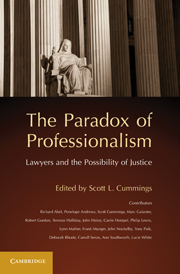Book contents
- Frontmatter
- Contents
- List of Tables and Figures
- Contributors
- Preface and Acknowledgments
- 1 Introduction
- PART I LAWYERS AND THE PUBLIC GOOD: THE FUNDAMENTAL DILEMMA
- PART II LAWYERS AND THEIR CLIENTS: DETERMINANTS OF ETHICAL PRACTICE
- PART III LAWYERS AND SOCIAL CHANGE: MOBILIZING LAW FOR JUSTICE
- 10 Without Fear, Favor, or Prejudice
- 11 Lawyers in National Policymaking
- 12 Cause Lawyers and Other Signs of Progress
- 13 African Youth Mobilize against Garbage
- 14 Epilogue
- Index
- References
12 - Cause Lawyers and Other Signs of Progress
Three Thai Narratives
Published online by Cambridge University Press: 05 June 2012
- Frontmatter
- Contents
- List of Tables and Figures
- Contributors
- Preface and Acknowledgments
- 1 Introduction
- PART I LAWYERS AND THE PUBLIC GOOD: THE FUNDAMENTAL DILEMMA
- PART II LAWYERS AND THEIR CLIENTS: DETERMINANTS OF ETHICAL PRACTICE
- PART III LAWYERS AND SOCIAL CHANGE: MOBILIZING LAW FOR JUSTICE
- 10 Without Fear, Favor, or Prejudice
- 11 Lawyers in National Policymaking
- 12 Cause Lawyers and Other Signs of Progress
- 13 African Youth Mobilize against Garbage
- 14 Epilogue
- Index
- References
Summary
THE ARRIVAL OF CAUSE LAWYERS
In 1973, a student-led uprising in Bangkok toppled an American-backed military dictatorship. About two decades after this turning point in modern Thai history, Benedict Anderson considered the post-uprising evolution of democratic government in a famous article, “Murder and Progress in Modern Siam.” The increasing number of assassinations of candidates for political office was a sign of progress, Anderson argued, because it proved that holding an elected office had become a valuable prize. Nearly a half-century later, there are more benign signs of progress, for example, the adoption of a liberal constitution in 1997 and laws protecting the environment, women, communities, and human rights. Western observers may attribute particular importance to the increasing visibility of lawyers committed to bringing these rights into play.
At best, these are ambiguous signs of progress. Thailand experienced its eighteenth military coup in 2006, and although this particular coup was kinder, gentler, and shorter than in the past – and a new constitution was adopted a year later – the military reminded the politicians that it remains a strong and legitimate power broker. In 2008, demonstrators brought down the latest elected government, receiving tacit support from the police, military, and, in the view of many, the revered royal family, as well as many educated elites wary of power exercised by poor, less well educated, rural voters. Mass demonstrations blockaded government buildings and seized major airports, violating laws with seeming impunity; the military and police held back.
- Type
- Chapter
- Information
- The Paradox of ProfessionalismLawyers and the Possibility of Justice, pp. 243 - 273Publisher: Cambridge University PressPrint publication year: 2011

